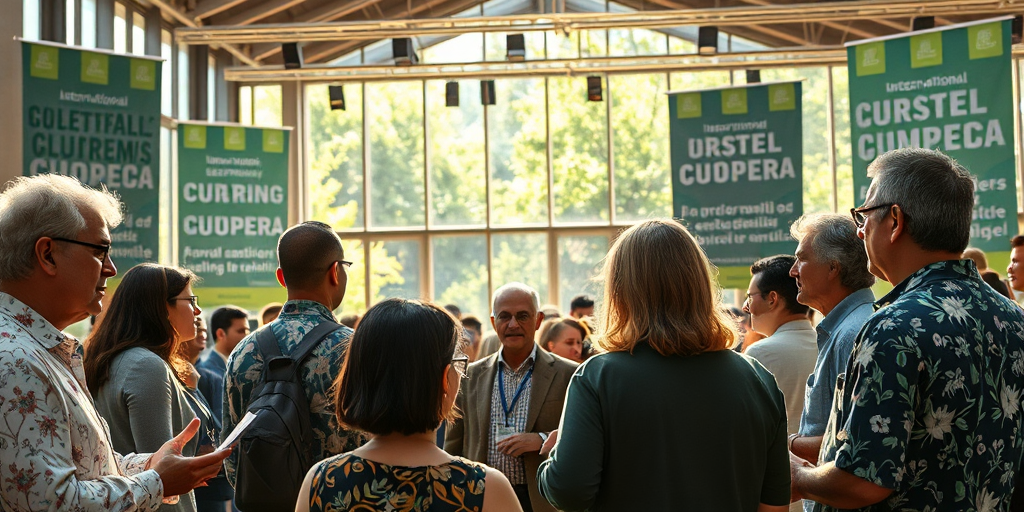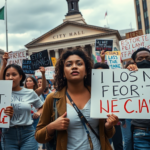**Material World: Celebrating Biological Diversity Day with Carp Couture**
In a harmonious blend of fashion and environmental consciousness, the celebration of International Day for Biological Diversity shines a light on innovative efforts in sustainable development and biodiversity. Recent initiatives highlighted by fashion leaders demonstrate a growing commitment to this cause, impacting the American community and the world at large.
**Innovative Partnerships Promote Sustainability**
A significant contribution to this year’s International Day for Biological Diversity comes from Inversa, an ethical exotic materials supplier. They have partnered with Colombian label Johanna Ortiz to unveil the Traditions Belt and Rituals Necklace, crafted from Silverfin, a material sourced from invasive species like silver carp. This innovative approach not only creates awareness about biodiversity but also showcases how fashion can transcend its conventional boundaries to become a powerful environmental advocate.
Sybil Borner from WWF Switzerland remarked, “Invasive species are the most neglected driver of biodiversity loss. Few entrepreneurs and biodiversity investors are looking at them, and they really should be.” This partnership with Inversa serves as hope for scalable solutions to pressing biodiversity challenges.
**The Role of Biodiversity Impact Assessment Framework (BIAF)**
The Biodiversity Impact Assessment Framework (BIAF), developed in collaboration with WWF Switzerland and the Biodiversity Consultancy, offers a comprehensive evaluation of biodiversity impacts. The framework addresses all five drivers of biodiversity loss: changing land and sea use, direct exploitation, climate change, pollution, and invasive species.
By utilizing this framework, Inversa is able to demonstrate the positive outcomes of their business model compared to a traditional business-as-usual scenario, allowing companies to pivot their operations toward more sustainable practices that benefit global biodiversity.
**Aid by Trade Foundation’s CAR-iSMa Project**
Another promising initiative is the CAR-iSMa project, spearheaded by the Aid by Trade Foundation. The project has transformed agricultural practices for 100,000 farmers across Africa, boosting crop yields by up to 37% in Côte d’Ivoire by promoting sustainable and climate-resilient farming methods.
Tina Stridde, the foundation’s managing director, notes, “It speaks for itself that far more than our target number of small-scale farmers chose to be trained in the theory and practice of regenerative and climate-resilient agriculture.” This success story not only brings hope to African farmers but also presents a model for similar efforts globally.
**Sustainability Innovations in Material Production**
Jilin Chemical Fiber is expanding its production of Jirecell and Reboocel, environmentally friendly fibers incorporating recycled content. This endeavor signifies a progressive step toward reducing reliance on traditional forest-derived fibers and promoting circular economy practices within the textile industry.
Simultaneously, Thermore has launched its Ecodown Fibers Sync insulation, made from 100% post-consumer recycled PET. Certified by GRS, Bluesign, and Oeko-Tex Standard 100, this innovation not only enhances the sustainability quotient of outerwear but also redefines thermal insulation design, illustrating an impressive alignment between responsibility, style, and performance.
**The Luxury Sector’s Stake in Biodiversity**
The luxury market, often perceived as distant from environmental concerns, is taking a vested interest in biodiversity. Positive Luxury’s briefing highlights nature as an essential asset, advocating for its integration into business strategies. The stated interconnection between luxury and nature underpins the importance of integrating biodiversity within corporate planning, unlocking significant economic and environmental benefits.
According to Positive Luxury, “Nature is more than a risk to manage—it’s a business asset to invest in.” This sentiment is echoed by stakeholders who recognize the necessity of preemptive action to remain resilient and relevant in a rapidly evolving market.
**Eurofins’ New Testing Method for Recycled Plastics**
On the technological front, Eurofins has introduced a novel testing method for recycled plastics, enhancing the accuracy of recycled content verification in textiles. This development underscores the industry’s commitment to transparency and accountability, ensuring that sustainability claims are substantiated by rigorous testing.
**Local Impact and Future Prospects**
The endeavors highlighted during the International Day for Biological Diversity not only foster global ecological balance but also resonate deeply with local communities across the United States. The integration of sustainability into various industries heralds future investment opportunities and elevates environmental and social standards.
These innovations and initiatives encourage residents to embrace eco-friendly practices, nurturing a collective effort toward sustainable development. As local businesses and communities adopt these practices, they contribute to a more resilient economy and a healthier planet for future generations.
By addressing biodiversity within corporate strategies, as posited by the World Economic Forum, businesses may unlock value creation opportunities, aligning with evolving environmental expectations and fostering long-term economic and ecological success.
For those seeking to engage further with these initiatives, resources such as public forums and online platforms offer avenues for involvement and provide detailed insights into sustainable practices and policies. Community interest in sustainability continues to grow, signifying an enduring commitment to preserving our planet’s biological diversity.







